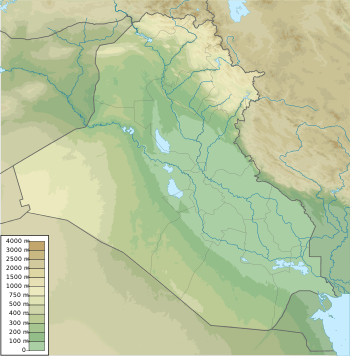Diniktum
| Diniktum | |
 Shown within Iraq | |
| Location | Baghdad, Baghdad Governorate, Iraq |
|---|---|
| Region | Mesopotamia |
| Coordinates | 33°17′37.0752″N 44°28′58.4112″E / 33.293632000°N 44.482892000°ECoordinates: 33°17′37.0752″N 44°28′58.4112″E / 33.293632000°N 44.482892000°E |
| Type | tell |
Diniktum, inscribed Di-ni-ik-tumKI, was a middle bronze-age town located somewhere in the lower Diyala region of Mesopotamia, on the Tigris river downstream from Upi and close to the northern border of Elam. It is possibly at or in the vicinity of Tell Muḥammad, which lies in south-eastern part of modern Baghdad. It is mentioned in the Harmal geographical list.[1]
History
It enjoyed independence briefly during the 18th century under the reigns of the Amorite chieftains (ra-bí-an MAR.DÚ) Itur-šarrum, attested on a single seal from Ešnunna, and Sîn-gāmil, son of Sîn-šēmi and a contemporary of Zimri-Lim (ca. 1710–1698 BC short) of Mari and Ḫammu-rapī (ca. 1728–1686 BC short) of Babylon.[2] In an old Babylonian letter from Yarim-Lim I, the king of Iamḫad whose capital was Halab, ancient Aleppo, to the Yašub-Yahad, the king of Dēr, he says:
.. Certainly. Sîn-gāmil, king of Diniktum. very much like you would repeatedly respond to me by means of lies and provocations. Having docked 500 boats in Diniktum's quay. I "sank" (supported?) his land as well as him for 12 year!"[3]— Iarīm-Līm, Tablet A. 1314, Letter to Yašub-Yahad
Ikūn-pî-Sîn (“The word of Sin is truthful”), the ruler of Nērebtum and possibly Tutub, cities in the sphere of Ešnunna, has a year name: “Year when Ikū(n)-pî-Sîn captured Diniktum." It was absorbed into the kingdom of Ešnunna and consequently embroiled in its conflicts with Elam during the reigns of Ibāl-pî-El II (ca. 1715–1701 BC short) and Ṣillī-Sîn (ca. 1700–1698 BC short).[4] The town was still settled in the later bronze-age, as a year name gives ““the year [in which] Kadašman-Ḫarbe, the king, dug the canal of Diniktum.”[5] Kadašman-Ḫarbe was a Kassite king of Babylon of the late 15th century.
References
- ↑ Tablet IM 51143.
- ↑ Douglas Frayne (1990). Old Babylonian period (2003-1595 BC): Early Periods, Volume 4 (RIM The Royal Inscriptions of Mesopotamia). University of Toronto Press. pp. 682–685.
- ↑ J. Sasson (1985). "Yarim-Lim's War Declaration". Editions Recherche sur Ies Civilisations. Paris. p. 244.
- ↑ Trevor Bryce (2009). The Routledge Handbook of The People and Places of Ancient Western Asia. Routledge. p. 196.
- ↑ Tablet Ni. 3199.